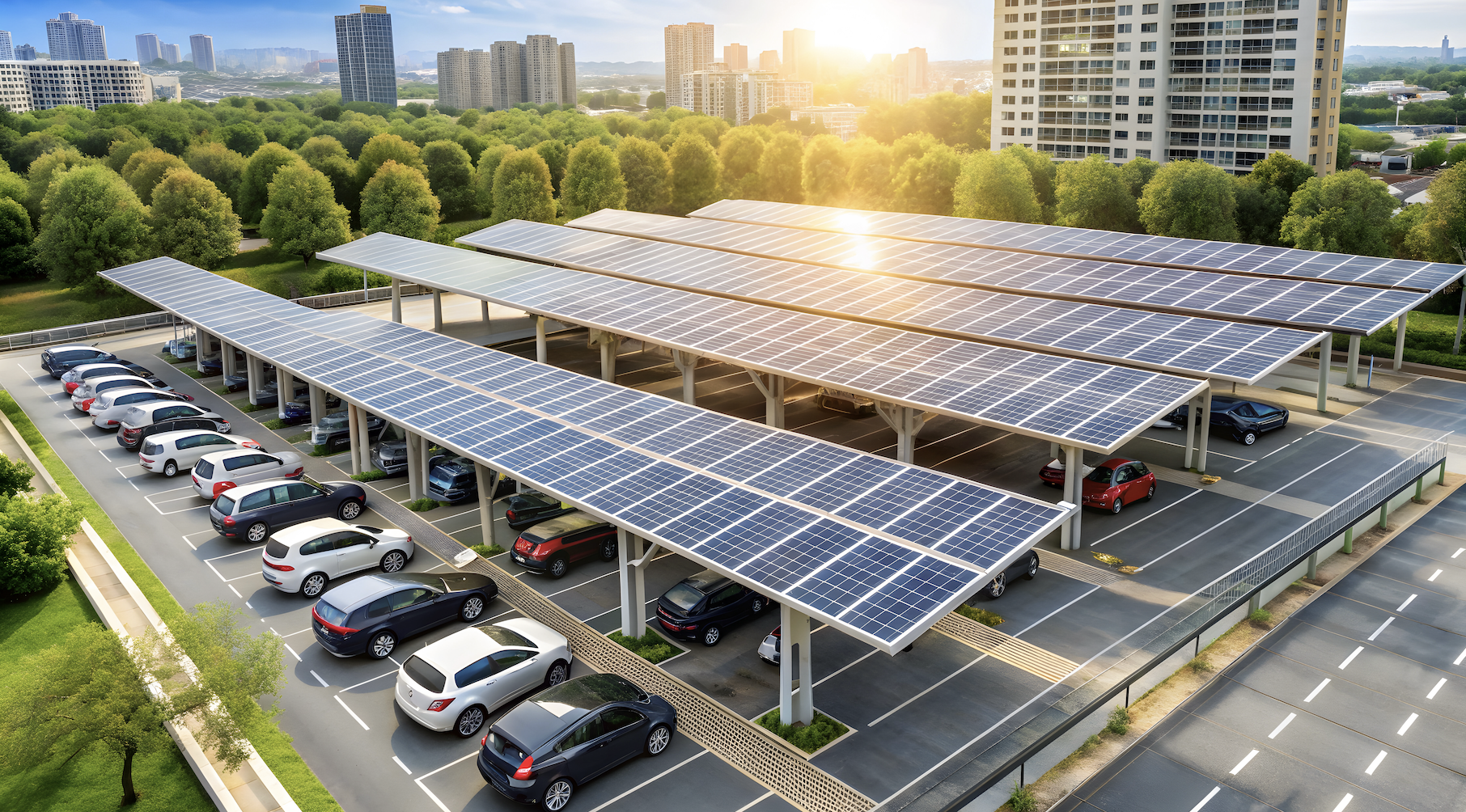Why is there a solar obligation for parking spaces?
The solar obligation promotes the use of renewable energies by introducing obligations to install photovoltaic systems (or solar thermal systems) for electricity generation. The solar obligation, also known as the photovoltaic obligation, usually applies to roof areas and parking lots, as these offer plenty of space for photovoltaic modules and thus generate as much electricity as possible. The aim of the solar obligation is to increase the share of electricity from renewable energies and accelerate the expansion of solar energy use. This obligation also contributes to greenhouse gas neutrality by 2045. Greenhouse gas neutrality is a goal of the German government and stipulates that the same amount of greenhouse gases must be emitted as are broken down, thus resulting in "net zero."
Which parking spaces are affected by the solar obligation?
For the most part, the solar obligation for parking spaces applies to newly built, open parking areas with at least 35 to 100 parking spaces (depending on the federal state). The parking space must also be suitable for solar use. The suitability is regulated differently depending on the federal state. If these requirements are met, a photovoltaic system must be installed. Depending on the federal state, the installation of a solar thermal system is permitted as an alternative. The use of external surfaces of buildings and areas in the direct vicinity is also possible instead of installing photovoltaic modules above the parking area.
The regulations of the individual federal states with solar obligations are explained below.
Compulsory solar energy in Baden-Württemberg
In Baden-Württemberg, a solar obligation was introduced with the further development of the Climate Protection Act from January 1, 2022. All newly built, open parking lots with more than 35 parking spaces for which the building application was submitted after this date must be equipped with a photovoltaic system above the parking area. The parking area must be suitable for solar use. Baden-Württemberg has established clear criteria for this: parking lots that are intended exclusively for passenger cars, whose surface is not inclined by more than ten degrees, and where at least four parking spaces are arranged next to each other are suitable. If these requirements are met, at least 60 percent of the parking space area must be covered with photovoltaic modules. Alternatively, the PV system can also be installed on the exterior surface of a new building in the immediate vicinity. An exception applies to parking spaces located directly along public roads.
Since 2022 and 2023, the solar obligation in the state has also been significantly expanded:
- Since May 1, 2022, the photovoltaic requirement no longer applies only to non-residential buildings and parking facilities, but also to all newly constructed residential buildings.
- Since January 1, 2023, the obligation also applies to fundamental roof renovations of existing buildings, provided that the roof surfaces are suitable for solar use.
In addition, since 2023, the state has been supporting the installation of photovoltaic systems on existing open parking lots (at least 35 parking spaces) with its own subsidy program in order to further expand the use of already sealed areas.
Compulsory solar energy in North Rhine-Westphalia
In North Rhine-Westphalia, a solar obligation has been in force since January 1, 2022, for newly built, open parking lots of non-residential buildings or commercial areas with more than 35 parking spaces for which a building application was submitted on or after this date. The parking area must be suitable for solar use. The law does not define exactly what "suitable" means or who assesses suitability—this is at the discretion of the building control authority. The photovoltaic system should be installed directly above the suitable parking area. Alternatively, a solar thermal system can be installed for heat generation.
As in Baden-Württemberg, the requirement does not apply to parking spaces located directly along public roads. Existing parking spaces are also excluded: the requirement applies exclusively to newly constructed open parking areas.
Since 2022/2023, there have been additional developments:
- The solar obligation has been extended to new residential buildings (from 2025), and in future it will also apply to fundamental roof renovations.
- There is currently no retrofitting obligation for existing parking lots, but subsidy programs are offered to voluntarily support the installation of photovoltaic systems on existing parking lots.
Compulsory solar energy in Rhineland-Palatinate
In Rhineland-Palatinate, the State Solar Energy Act (LSolarG) has stipulated since January 1, 2023, that a photovoltaic system must be installed on new commercial buildings and newly constructed commercial parking facilities with at least 50 parking spaces. The PV system must cover at least 60% of the area considered "suitable." Alternatively, depending on the design, a solar thermal system can be used for heat generation, provided this is permitted.
The obligation applies to new, commercially used parking areas and not necessarily to existing parking spaces. The law also provides for exemptions, for example in cases of technical unfeasibility.
From January 1, 2024, the obligation was extended to new buildings and parking lots of public buildings, as well as to larger roof renovations of public buildings. Accordingly, private residential buildings are not automatically subject to a PV system obligation—however, the law does contain an obligation for new residential buildings to be prepared to be "PV-ready."
Compulsory solar energy in Schleswig-Holstein
In Schleswig-Holstein, a solar obligation under the EWKG has been in force since January 1, 2023, for new commercial and non-residential buildings and for newly constructed open parking lots with more than 100 parking spaces, provided that these are suitable for solar use.
Following the amendment to the law in 2025, this obligation was further tightened: From this point on, photovoltaic systems must also be installed on new residential buildings, larger roof renovations of non-residential buildings, and new parking lot constructions, expansions, or renovations with at least 70 parking spaces. The PV system must be installed above the parking space area suitable for solar use. Alternatively, if permitted, the system may be installed on other exterior or roof surfaces of adjacent buildings or areas in the immediate vicinity. In some cases, a solar thermal system may also be considered as an alternative.
Exceptions are possible under certain conditions—for example, if the solar system would not be feasible for technical or public law reasons or would represent an excessive economic burden.
Solar obligation in Lower Saxony
In Lower Saxony, there has been a comprehensive obligation to install photovoltaic systems (PV obligation) in new buildings and in the case of significant roof modifications since January 1, 2025. In new buildings or buildings with roof areas of at least 50 m², at least 50 percent of the roof area must be equipped with solar energy systems for electricity generation. The requirement applies to both residential and non-residential buildings.
In addition, the obligation also applies to newly constructed open parking lots or parking decks with more than 50 parking spaces: a PV system must be installed above the parking space area suitable for solar use. Exceptions are possible, e.g., if technical, legal, or economic reasons speak against implementation or if a solar thermal system is already in place.
Solar obligation in Bavaria, Berlin, Bremen, and Hamburg
In Bavaria, Berlin, Bremen, and Hamburg, the solar obligation primarily applies to new buildings and roof areas of residential and non-residential buildings, not parking lots.
- Bavaria: Since July 2023, new commercial and non-residential buildings have been required to install photovoltaic or solar power systems on their roofs.
- Berlin: Since January 2023, there has been a general obligation to equip new buildings or buildings undergoing major roof renovations with solar panels, provided that the roof area reaches a certain minimum size (e.g., ≥ 50 m²). This obligation applies to both residential and non-residential buildings.
- Bremen: A PV requirement has been decided for new buildings—but with a later start date: The requirement for roof areas is to apply from July 2025. New requirements for extensive roof renovations or conversions have already been in place since mid-2024.
- Hamburg: Since January 2023, new buildings (residential and non-residential) must be equipped with a photovoltaic or solar system.
Learn how you can combine electric charging stations with barrier-free parking space management!
ContactContact experts nowWhat about the solar obligation in the other federal states?
Other federal states have not (yet) decided on a binding solar obligation for new buildings. However, according to the coalition agreement, at least the use of roof space for photovoltaic systems is to be promoted: this is mandatory for new commercial buildings, while it is to be a standard recommendation for new residential buildings.
This is how the solar obligation contributes to sustainable mobility
Renewable energies are thus promoted more intensively with the country-specific solar obligations, thereby increasing their share in the total production of electricity. Thus, parking spaces with photovoltaic systems contribute directly to sustainable mobility, as does digital parking management, which reduces land sealing, air pollution and waste. You can read more about this in this article: Contribution of digital parking management to the sustainable transport transition







.png)